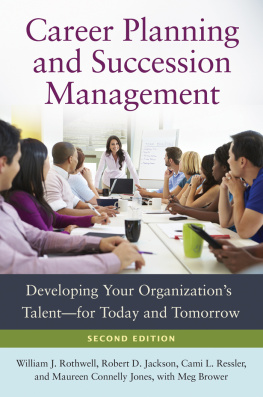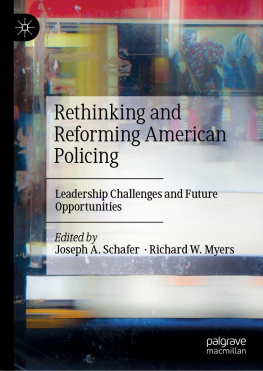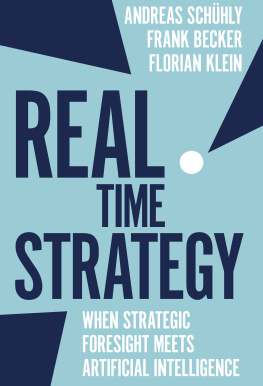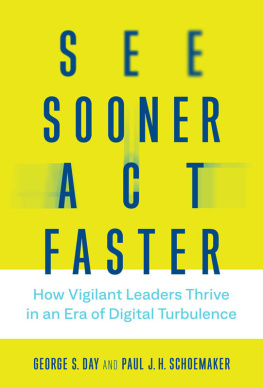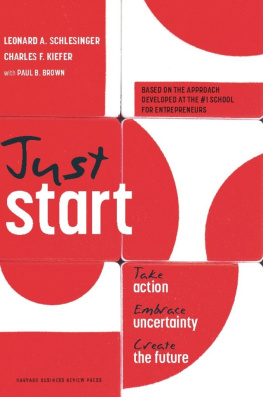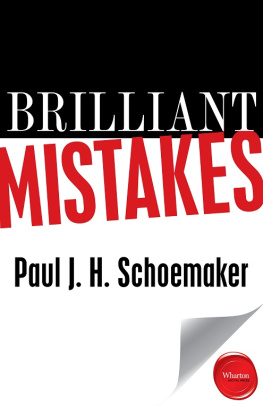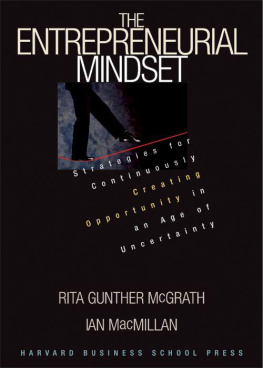
Thank you for purchasing this Free Press eBook.
Join our mailing list and get updates on new releases, deals, bonus content and other great books from Free Press and Simon & Schuster.
C LICK H ERE T O S IGN U P
or visit us online to sign up at
eBookNews.SimonandSchuster.com

Contents
I dedicate this book to my children, Kim and Paul, in the hope that they will navigate lifes uncertainties with resilience, intelligence, honor, and humor.
Acknowledgments
Those who aim high usually stand on the shoulders of others. This book tackles a very challenging and increasingly important subject, in a way that is accessible to managers. I wish to acknowledge here the shoulders my feet rested on. To properly apportion my intellectual debt, I offer a brief chronological account of the interesting journey that led me to this book.
My interest in uncertainty traces back to my undergraduate days as a physics major. This field taught me that common sense serves us well in the middle of the spectrum (where Newtonian physics reigns), but that to understand the extremes of the spectrum, we need uncommon sense. From the enigma of the big bang to the indeterminacies of quantum physics, the edges force us to confront ourselves, our own mental models, and the sense-making process we engage in. The same applies to uncertainty in the economic realmabove all we face ourselves as we stand naked before the unknown with little to hold on to for comfort or support.
In graduate school my interests shifted to economics and finance and later to decision making as an intriguing subject of study. I wrote my doctoral thesis at Wharton on the limitations of expected utility theory, the prevailing model of choice under risk at the time. Here I benefited much from the keen minds of Howard Kunreuther (my adviser), Paul Kleindorfer, and later Jack Hershey. I fondly recall the stimulating dialogues with Howard and Paul as we teamed up to write our graduate text Decision Sciences (Cambridge University Press, 1993). With Jack Hershey I published several academic papers probing the nature of peoples risk attitudes, especially their biases and sensitivity to context.
Around 1979 I moved to the rarified halls of the University of Chicago, where I joined the newly formed Center for Decision Research. This research group was led by the late Hillel Einhorn, a gifted scholar in behavioral science. Operating in the shadows of finance and economics, our fledgling group advanced heretical notions about bounded rationality and flaws in human judgment. I befriended Jay Russo, from whom I learned much about cognitive psychology and with whom I wrote Decision Traps (1989) and later Winning Decisions (2002). I also learned much from my other behavioral colleagues, notably Robin Hogarth, Josh Klayman, and George Loewenstein. Our workshops with guest speakers were always fun and spirited as we listened to and debated the best minds in the field.
After I was promoted to associate professor at the University of Chicago, I thought it wise to look at how the real world deals with uncertainty. In 1982 I took an extended sabbatical with the planning group of Royal Dutch/Shell in London that had been pioneering scenario planning under the inspired leadership of Pierre Wack and Ted Newland. At Shell I was privileged to work with Arie de Geus, Kees van der Heijden, and Peter Schwartz, all of whom later wrote significant books about planning under uncertainty. Like Chicago, Shell was fermenting with novel ideas as a constant stream of creative visitors passed through. The Shell experience painted a sharp contrast between theory and practice and increased my respect for the complexity and importance of context in real-world decision making.
Upon my return to Chicago, I turned my attention from decision making to strategy, a field that was still in its infancy and had little legitimacy at the University of Chicago. I was fortunate that Dan Schendel, founder and director of the Strategic Management Society (SMS), visited us for a sabbatical year, and I much enjoyed our frequent lunches. With Raffi Amit, who was then at Northwestern University, I started to explore the behavioral foundations of the resource-based view of strategy. In 1993 we published a joint article in the Strategic Management Journal titled Strategic Assets and Organizational Rent. This work was later honored with SMSs best paper award and forms the basis for of this book. While at Chicago I also got involved in various consulting engagements that further challenged the pristine models of academia. I am much indebted here to the numerous executives I worked with across a variety of functions and industries.
In the mid-1990s, as my interest and focus shifted to my company Decision Strategies International, we moved to Philadelphia, where I reconnected with friends and colleagues at the Wharton School. I teamed up with George Day, who had started to study emerging technologies through a center composed of multiple disciplines. I was invited to join this group as a part-time research director and later edited with George Day the book Wharton on Managing Emerging Technologies (New York: John Wiley, 2000). The subject of uncertainty is front and center when studying emerging technologies, and I benefited greatly from the stimulating discussions of our core faculty group, which consisted of George Day, Bill Hamilton, Harbir Singh, Jitendra Singh, and Sid Winter. Also, the executives who joined our research center as industry partners are thanked for their spirited discussions and valued experiences, especially Larry Huston (Procter & Gamble) and Terry Fadem (DuPont).
I have learned much from my colleagues at Decision Strategies International (DSI), who helped conduct many of the consulting projects on which this book is based. In particular, Michael Mavaddat and Roch Parayre proved to be very stimulating colleagues who blend a curious mind with a pragmatic orientation. Stephen Dull and Doug Randall also have been valued DSI colleagues. In addition, various executives in our client organizations also helped shape my thinking, especially Mary Jean Connors (Knight-Ridder), Gabriel Gedvilla (Weyerhaeuser), Leon Mandel (Lagoven), Nanty Meyer (Berkeleys Haas School of Business), Michael Packanowski (W. L. Gore), Anil Patel (U.S. Army Corps of Engineers), Howard Rosoff (NatWest Bank), Steve Rossi (Knight-Ridder), Franck Schuurmans (Credit Union Executives Society), Sue Sheuerman (Household Finance), Dean Taylor (Ross Products), and Randy Woelfel (Shell Oil), as well as my academic and consulting colleagues from the McKinsey Forum.
Several friends and colleagues have offered valuable commentary on earlier manuscript drafts, for which I thank them greatly. They are Stephen Dull (DSI), Terry Fadem (DuPont), Paul Kleindorfer (Wharton), Jeff Kuhn (Columbia University), Howard Kunreuther (Wharton), Michael Mavaddat (DSI), Hugh Courtney (McKinsey), Roch Parayre (DSI), Anil Patel (U.S. Army Corps of Engineers), Doug Randall (DSI), Franck Schuurmans (Credit Union Executives Society), Gabriel Szulanski (Wharton), and Michael Tomczyk (Wharton). In addition, I am much indebted to those whom we interviewed and quote in the pages of this book: Russ Ackoff, Louis Arnitz, Tom Borger, Eric Brooks, George Day, Terry Fadem, Tom Graham, Mike Hostetler, Alberto Ibargen, Paul James, Dave Landsberg, Michael Mavaddat, Jack McAdoo, Roch Parayre, Rudy Pereira, Jay Russo, Franck Schuurmans, Scott Snyder, Jeff Yass, and Jeff York. Also, I am grateful for the wise counsel, moral support, and seasoned editorial judgment rendered by Robert Wallace from the Free Press. Furthermore, we thank Celia Knight for her meticulous editing, and Michel Dijkstra for his help with the artwork.
Next page

